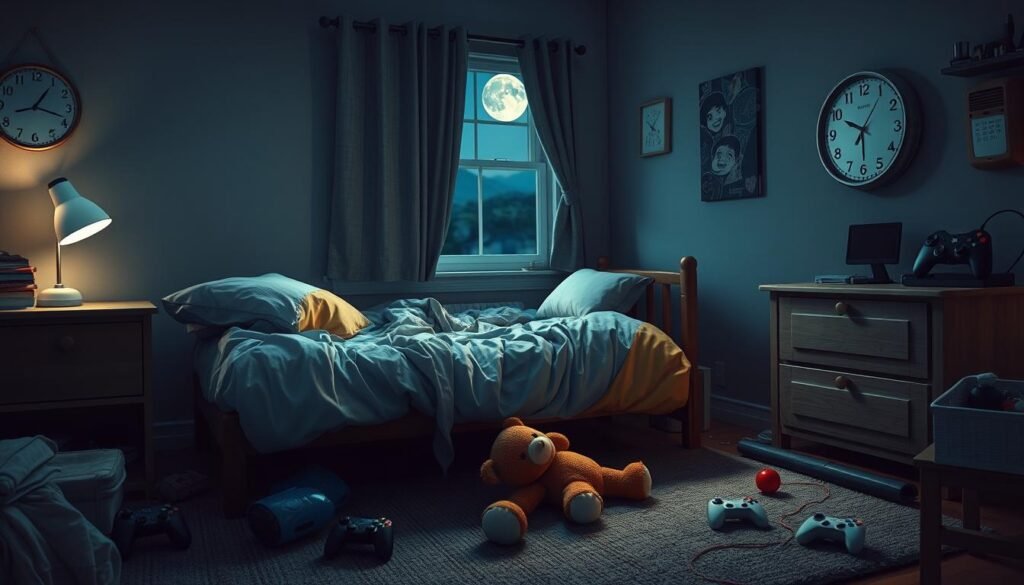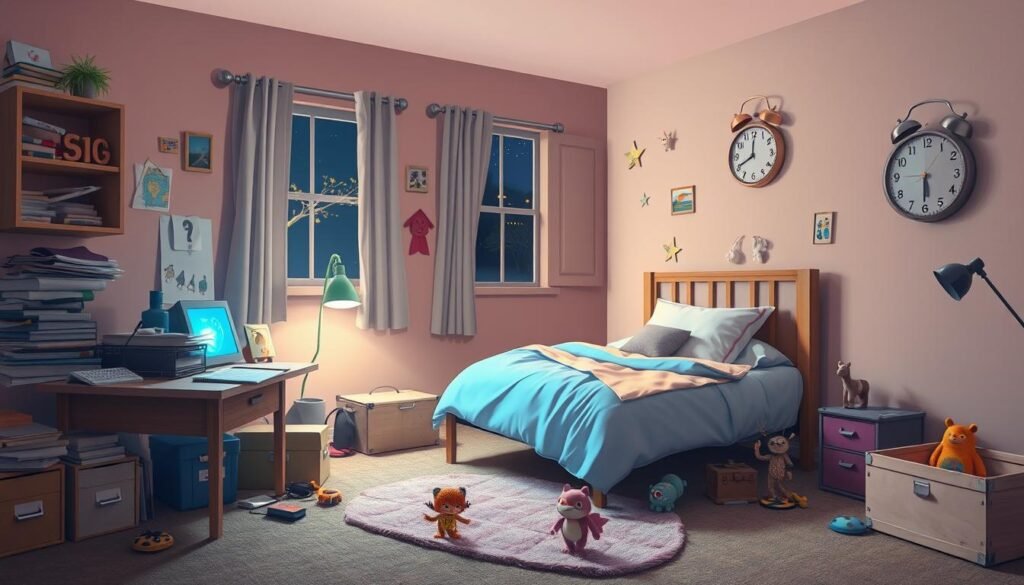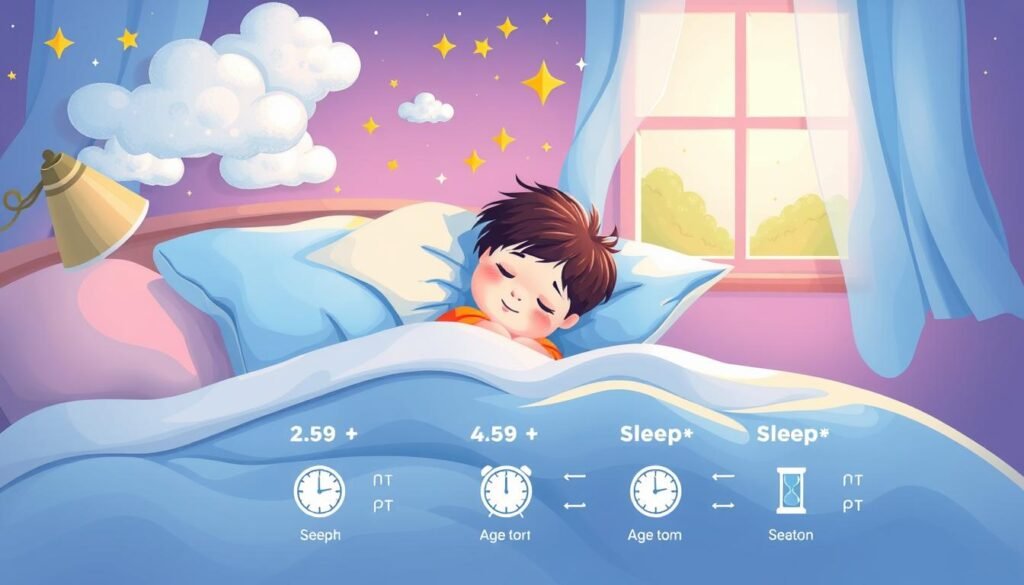Did you know that up to 25% of children have insomnia at some point? This shows how important it is to understand child sleep disorders. For a nine-year-old, dealing with these issues can lead to being very tired and having more behavior problems. Parents need to be patient and look for ways to help their child sleep better. This guide will talk about how insomnia affects children. We will also share tips to help families get a good night’s sleep.
Key Takeaways
- Insomnia affects up to 25% of children, needing parental attention.
- Understanding child sleep disorders is crucial for effective management.
- Creating a consistent bedtime routine can significantly impact sleep quality.
- Emotional factors and daytime behaviors often influence nighttime restlessness.
- Consulting a pediatrician is recommended if sleep issues persist beyond two weeks.
- Cognitive Behavioral Therapy for Insomnia (CBT-I) can be more effective than medication.
Understanding Child Sleep Disorders
Many families deal with child sleep disorders. Studies show up to half of all children might have a sleep issue. This includes problems like pediatric insomnia, which can hurt their mood, behavior, and schoolwork.
Kids may experience issues like sleep apnea, sleepwalking, and nightmares. For example, 17 percent of kids sleepwalk. Meanwhile, 3 to 5-year-olds can suffer from nightmares at rates between 10 and 50 percent. Often, these problems are due to stress or bad sleep habits.
Learning about these sleep disorders can help parents. Simple steps like a regular bedtime, less screen time before sleeping, and relaxation can help fight insomnia. Visiting websites like sleep improvement guides for children may provide helpful advice.
It’s key to spot sleep problem symptoms early. Not enough sleep can make a child grumpy, struggle to control emotions, and do poorly at school. Parents must watch out to ensure their kids get enough rest.
| Common Child Sleep Disorders | Prevalence |
|---|---|
| Sleepwalking | 17% |
| Nightmares (ages 3-5) | 10-50% |
| Behavioral Insomnia of Childhood | 10-30% |
| Obstructive Sleep Apnea | 1-5% |
| Restless Leg Syndrome | 2% |
Solving childhood sleep issues means understanding each child’s unique needs. Good sleep habits and a peaceful bedtime setting can make a big difference in a child’s sleep.
Signs of Insomnia in Children
It’s important to spot the signs of insomnia in children early. Changes in how they act can show they’re not getting enough sleep. School kids need about 10 hours of sleep each night. Lack of sleep in 9-year-olds can lead to:
- Irritability and mood swings
- Difficulty concentrating in school
- Falling asleep during the day
- Frequent awakenings throughout the night
These symptoms might look similar to those of attention disorders. This can make it tough to recognize insomnia in kids. Did you know about one in five kids between 8 to 16 years old report having insomnia symptoms?

Noticing these changes early is key. Taking action against insomnia is important for a child’s growth and health. For tips on identifying sleep problems, check out this helpful resource.
Causes of 9 Year Old Insomnia
Knowing why 9 year olds can’t sleep helps fix their sleep problems. Different things can mess up a child’s sleep. This leads to bad sleep habits and restless nights for them. Finding out what’s wrong is the first step to better sleep.
Daytime Behaviors Affecting Sleep
What kids do during the day affects their sleep at night. Too much time on screens can make it hard for them to calm down. Also, not having a regular sleep schedule or enough exercise can cause sleep issues.
Having a regular routine and less screen time before bed is key. This helps kids sleep better.
Impact of Stress and Anxiety
Feelings matter a lot when it comes to sleeping well. Stress from school, friends, or family can make kids anxious. This anxiety can keep them up at night. Helping kids deal with these worries can make it easier for them to sleep.
Effects of Diet and Caffeine
What kids eat affects their sleep. Too much sugar can make them too energetic. And caffeine, in sweets and some drinks, can stop them from sleeping. Knowing how food choices impact sleep helps parents make better choices for their kids.
Making changes to a child’s diet can improve sleep. It deals with the reasons why 9 year olds can’t sleep. Parents looking for more information can read about childhood insomnia.

How Much Sleep Do Children Need?
It’s vital for parents to know how much sleep their kids need. This knowledge helps kids grow well both physically and mentally. Enough sleep improves a child’s mood, behavior, and health. Knowing how much sleep each age needs is key for their best health and happiness.
Recommended Sleep Duration for Different Age Groups
Different ages need different amounts of sleep. Let’s break it down:
| Age Group | Recommended Sleep Duration |
|---|---|
| Newborns (0-3 months) | 16-18 hours per day |
| Infants (4-11 months) | 12-16 hours per day |
| Toddlers (1-2 years) | 11-14 hours total (including naps) |
| Preschoolers (3-5 years) | 10-13 hours per day |
| School-age children (6-12 years) | 9-12 hours per night |
School-age children need plenty of sleep, the most recommended. Not sleeping enough can lead to problems like gaining too much weight, having a hard time behaving, and not doing well in school.

Importance of Regular Sleep Patterns
A steady bedtime routine matters for kids’ sleep patterns. An irregular schedule can mess with their sleep cycle. This can make it hard to fall and stay asleep. Parents should set a calm routine before bed. This helps kids know it’s time to sleep, improving their sleep habits and quality.
For tips on sleep, parents can check KidsHealth. Putting sleep first helps kids do better in school and life. They’ll be happier, more rested, and ready for the day.
Managing Insomnia in 9 Year Olds
To manage insomnia in 9 year olds well, we should have a good bedtime routine, make the bedroom sleep-friendly, and follow good sleep hygiene. Each of these steps is key for better sleep and peaceful nights.
Creating a Consistent Bedtime Routine
A calming bedtime routine is vital. It might include reading, a warm bath, or relaxation exercises. Doing calming activities every night tells your child it’s time to sleep. This routine helps kids fall asleep faster and sleep well all night.
Establishing a Sleep-Friendly Environment
A child’s room should help them sleep well. It should be dark, cool, and quiet. Use blackout curtains and white noise machines if needed. Comfy bedding also helps avoid sleep disruptions. These changes make the bedroom a perfect place for rest.
Implementing Good Sleep Hygiene Practices
Good sleep hygiene is essential for handling insomnia in 9 year olds. Cut down on screen time before bed to reduce blue light exposure. Encourage eating well and limit caffeine 4-6 hours before sleep. Following these steps improves sleep quality, mood, and how well children do during the day.
Behavioral Therapy for Pediatric Insomnia
Behavioral therapy helps kids with sleep troubles. Cognitive behavioral therapy for insomnia (CBT-I) is popular. It treats sleep issues without medicine. It changes how families think about and approach sleep, leading to better habits.
Cognitive Behavioral Techniques
Cognitive behavioral therapy changes negative thoughts and actions about sleep. Here are some key methods:
- Identifying negative beliefs about sleep: Kids learn to spot and change wrong ideas about sleeping.
- Sleep restriction therapy: Limits time in bed to improve sleep, increasing it slowly as sleep gets better.
- Stimulus control therapy: Teaches kids to connect being in bed with sleeping, not staying awake.
- Relaxation techniques: Shows kids how to use deep breathing or visualization to calm sleep anxiety.
Gradual Sleep Independence Training
Teaching kids to sleep on their own is vital. They learn to soothe themselves back to sleep. Here’s what to do:
- Create a bedtime routine that signals sleep time.
- Start leaving the room at bedtime to promote solo sleep.
- Give kids a comforting item, like a special blanket, for security.
- Reward them for sleeping on their own.
These strategies help in handling pediatric insomnia. Focusing on CBT-I, children gain the ability to sleep by themselves. This leads to better, more restful nights.
Addressing Nighttime Wakefulness in Children
Nighttime wakefulness can be hard on both kids and parents. It’s important to know how to handle these moments right. Doing so promotes better sleep for everyone. When parents have clear rules on managing wakefulness, kids can become more independent in calming themselves.
How to React When a Child Wakes Up at Night
Quick reactions matter a lot when kids wake up at night. It’s key to reassure them calmly. Parents should gently comfort their child and avoid making it a habit for them to sleep in the parents’ bed. Try to:
- Approach with a calm demeanor
- Provide verbal reassurance
- Encourage settling back to sleep independently
Avoiding too much excitement helps kids go back to sleep easier. This way, kids can gain confidence in calming themselves.
Methods to Encourage Self-Soothing
It helps when kids know how to calm themselves at night. Here are some good methods:
- Introduce deep breathing exercises
- Provide a comfort object, like a stuffed animal
- Encourage quiet activities, such as soft music or reading, if needed
Teaching kids these techniques makes them feel safe and able to sleep on their own. This can keep sleep problems that cause bad behavior away.
| Self-Soothing Techniques | Benefits |
|---|---|
| Deep Breathing Exercises | Helps calm the nervous system |
| Comfort Objects | Provides a sense of safety and security |
| Quiet Activities | Promotes relaxation and distracts from anxiety |
Sticking to these methods can make night wakings less common. This improves sleep quality for kids. Focusing on the right strategies and self-soothing can make nights more peaceful. This leads to healthier sleep habits over time.
Dealing with Childhood Sleep Problems
Many kids have bedtime anxiety and nighttime fears. These can stop them and their parents from sleeping well. It’s important for adults to understand that feeling scared at night is normal for kids. It really affects their sleep.
Listening and showing support can help kids overcome their fears at night. Parents can make kids feel safe by using night-lights or letting them have their favorite toys close. These steps can calm anxiety without making the fear worse.
Nighttime Fears and Bedtime Anxiety
Some children have night terrors, which are different from nightmares. Night terrors happen in the first part of the night. The child might seem lost and very scared. Parents need to be calm and comforting during these moments. They should gently help their child back to sleep.
Keeping the bedroom calm and the same each night helps stop night terrors. This makes the bedroom a peaceful place for the child.
Identifying and Addressing Night Terrors
Knowing the signs of night terrors and anxiety can improve a child’s sleep and happiness. If a child often wakes up upset or seems very tired, it might be time to talk to a doctor. A relaxing bedtime routine can also make a big difference.
Better sleep makes sure kids are well-rested. For more help on sleep problems because of feelings, you can check out this resource. It has great advice and tips.